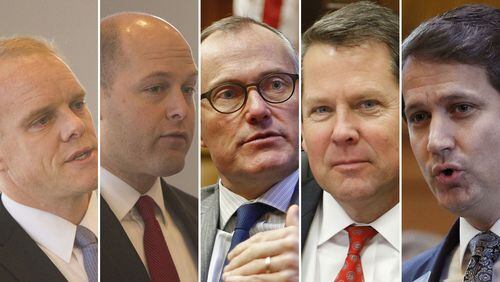Brian Kemp vowed to outdo Mississippi by signing into law even tougher abortion restrictions. Hunter Hill criticized the students who walked out of schools to protest gun violence.
Michael Williams has upped his calls for illegal immigration crackdowns. And Clay Tippins has doubled down on his pledge to expand the medical marijuana program.
The Republican candidates for governor gunning for a spot in a likely runoff have increasingly pivoted toward social issues, some more divisive than others, to contrast themselves in the crowded field.
They’re all aiming for a date with Lt. Gov. Casey Cagle, the GOP front-runner who has a commanding lead in public and private polling and a faint shot at an outright win in a vote that’s two months away.
Cagle made an attention-grabbing move in a divisive debate of his own earlier this month when he threatened to “kill” a tax break that would have benefited Delta Air Lines after the company cut marketing ties with the National Rifle Association.
And on Wednesday he launched the first volley in a more than $4.4 million ad blitz that opens with a line aimed at GOP rivals promising conservative upheavals: "Political talkers may mean well, but leaders get things done."
The rightward scramble illustrates the tension ahead of the May 22 primary.
The voters who cast ballots in Republican primaries tend to be far more conservative than the electorate that shows up for general elections. And candidates are increasingly appealing to their bases with strong stances on hot-button issues.
The two Democratic candidates, former House Minority Leader Stacey Abrams and ex-state Rep. Stacey Evans, are also employing the same strategy, hoping that strong stances on gun control, higher education and abortion rights will drive liberals to the polls in droves.
But some Republican elders worry that the GOP race to the right could hurt the party’s nominee in the long run.
"That's politics and I understand politics. But I would hope we do not find ourselves in a posture of taking actions that we cannot sustain," said Gov. Nathan Deal, who has sounded a note of regret about his own GOP "heat of the moment" duels.
“If I’ve learned anything in the many races I’ve run,” Deal told The Atlanta Journal-Constitution, “it’s be careful what you promise because somebody is going to ask you if you’ve fulfilled your promises.”
‘Life and death’
A state senator, Williams has long specialized in headline-grabbing stances. He’s tried to position himself as the most vocal loyalist of President Donald Trump — Williams was the first state official to endorse his campaign — and has echoed many of his policies in Georgia.
Williams announced a raffle of bump stocks shortly after gun control advocates called for a ban of the device, which was used by a Las Vegas gunman who killed dozens of concertgoers. And he’s pledged to give local law enforcement officials more authority to deport immigrants who are in the country illegally.
Tippins, a technology executive and first-time candidate for public office, has emphasized an issue that was once touchy for conservatives: an expansion of medical marijuana.
He has twice visited the statehouse to call on Cagle and other legislative leaders to boost the state’s program and meet with the families of children who rely on cannabis oil to treat debilitating illnesses.
“This is literally about life and death,” Tippins said this week at a press conference that Williams also attended, after accusing Cagle and Senate leaders of effectively “killing” a push to boost the program this year by assigning a committee of lawmakers to study the issue for another year.
Hill has put a pledge to significantly reduce the state budget and income tax rates at the center of his campaign, and he had harsh words for the thousands of students who walked out of schools last week to commemorate victims of the mass shooting in Florida and call for tighter gun restrictions.
“Students are in school to learn and prepare themselves to enter the workforce or go to college — not make political statements that take away time from their education and burden our teachers, principals and law enforcement officers,” said the former state senator, who praised school officials who disciplined students for the walkouts.
Over the past few weeks, though, it may be Kemp who is most aggressively trying to outflank his opponents.
The secretary of state recently unveiled a plan for a "criminal alien database" to track the crimes of people who are in the country without documentation and speed their deportations. He's trumpeted a sales-tax holiday for guns and ammunition timed for the July 4 celebration.
And he set off a chain reaction Tuesday when he declared himself a supporter of a new Mississippi law that bans most abortions after 15 weeks — and said he would seek to outdo those limits if elected governor.
“If abortion rights activists want to sue me … bring it!” he wrote on social media. “I’ll fight for life at the Capitol and in the courtroom.”
Kemp’s stance came shortly after Mississippi Gov. Phil Bryant signed the measure, which makes exceptions only for medical emergencies or cases in which there’s a “severe fetal abnormality.”
Within hours, Hill and Tippins also praised Bryant’s decision. And Williams issued a press release touting his support for a “heartbeat bill” that bans abortion at six to eight weeks if a heartbeat is detected.
A knockout blow?
Cagle has sought to remain above the fray as his rivals blast him in TV ads or at press conferences. In one recent forum, he dismissed attacks from Williams. And he didn’t join the scramble this week to match Bryant’s position on abortion, instead saying his “strong pro-life record speaks for itself.”
“My opponents’ campaign promises could double as thank-you notes for my record,” Cagle said Wednesday. “They say they’re going to pass pro-life laws, I’ve done it. They say they’re going to crack down on illegal immigration and sanctuary cities, I’ve done it.”
Public and private polling, in some cases surveys released by other campaigns, show Cagle hovering in the mid-30s to low 40s — and a tight race among the four other leading contenders for the second-place spot.
But Cagle’s campaign could also angle for the knockout blow, unloading most of the nearly $7 million in his campaign coffers to aim for the majority vote he needs to avoid a runoff. An internal poll released by Hill showed Cagle within striking distance — at 48 percent — when factoring in undecided voters.
Analysts and GOP operatives say that prospect is a long shot, particularly given that his top rivals each have seven-figure campaign bank accounts and spent months building support for their bids. But they also point to the unpredictable nature of runoffs.
They need look no further than Deal’s 2010 race. He finished a distant second to Karen Handel in a crowded Republican primary, but he narrowly edged her in the head-to-head runoff weeks later.
“Can (Cagle) do it? Possible, but not likely,” Kennesaw State University political scientist Kerwin Swint said. “It’ll no doubt be a tall order with five major candidates in the field, all of whom have raised at least enough money to make a dent. But even if they go to a runoff, that investment in resources and grass roots could pay off at the end.”
The barrage of attention Cagle received from his Delta stance and his escalating ad campaign may not have a lasting impact. Asked about the prospect of an outright win, veteran GOP strategist Jackie Gingrich Cushman ticked off the strengths of several of Cagle’s opponents.
“Remember that neither national media attention nor money necessarily translate into votes,” said Cushman, a GOP operative who invoked two recent Republican victories. “If money was all that counted, we would have Jon Ossoff as a congressman and Hillary Clinton as president.”
The lieutenant governor was sanguine about his chances.
“We have a very carefully laid strategic plan and we are in activation mode. I look forward to carrying our message across the state and earning every vote I can,” he said. “Mathematically, it’s very challenging, but when you are in position to press your advantage, it’s encouraging.”
Never miss a minute of what's happening in Georgia Politics. Subscribe to PoliticallyGeorgia.com.
About the Author








